This is a somewhat belated thank you to everyone who contributed to the success of ALL’s Language World 2024. I thoroughly enjoyed the two days spent in excellent company of fellow-teachers and firm friends. It’s lovely to meet online, it’s great to spend a morning at a conference, but having the chance to have breakfast, lunch, dinner and a dance with people who share your passion is the ultimate treat for me!
Here's the embedded album:
There are great official photos taken by our own, our very own talented photographer, Laura Simons.
Great to see you Laura! [Oh, and look: Shirley and Isabelle in the background!
I am privileged to have been invited to be a Trustee on the ALL Management Board, so I see at first-hand how much work goes into the running of this association by volunteers. René Koglbauer is our brilliant Chair, and organises purposeful, well-run meetings as well as doing his demanding ‘day job’; the Trustees work extremely well together, each one bringing a different aspect of experience to the board, all ‘listeners’ and ready to challenge the status quo when needed; and we are lucky to have such an enthusiastic and caring presidential team with of Liz Black as our current president and Judith Rifeser as our President Elect.

We could not do without our exhibitors and corporate
members who pay for stands and thereby subsidise the conference. But I am sure that they will have appreciated
our interest in what they have to offer. And there was always a buzz at the
breaks in the bright, airy space provided at the conference centre. As teachers, our lives can be made so much
easier by the commercial sector, providing resources for teaching and
assessing, training, and support for trips abroad.

Romain Devaux of
L’Institut français – just one of the many stands.
Here’s a summary of the sessions I chaired.
First up was Shirley Kliment-Temple (I just
love her name!) ‘Engaging backup from home’. She modestly shared some truly inspiring stories of how
she has managed to involve parents and the community in language and extra
-curricular activities, especially helped by successful applications for Turing
finding.
Shirley Kliment Temple. [It is she].
SESSION 1.2
Bel Alonso prepared exceptionally well to give us 5 main ideas
regarding ‘The Future of Language Teaching and Learning with
AI’. Clearly in her classrooms, it
is not the future but the exciting present in her everyday teaching. She gave us the chance to try out the amazing
resources available at the end. I really
hope I get to hear her again some time.
Bel Alonso has everyone engaged. She is at the back, in the turquoise!
SESSION 3.1
Sarah Brooks packed loads of ideas into her session
on ‘Effectively supporting the unique needs of trainee teachers in MFL’,
and I spoke with one of the delegates who deliberately came to this session as
she is a trainee teacher. She found it
just as helpful as those who are responsible for the support. Thank you, Sarah!
SESSION 3.2
Sohelie Zafar shared brilliant
practical and common sense ideas on ‘How to HOD’ in a lively
presentation straight from the heart!
There was a lot of nodding and agreement going on! Do get to hear her if you can!
SESSION 4.1
There was such fun and laughter in Gina Hall’s session ‘One way to further learners’ language acquisition is through their taste buds’ – the ideal title for a conference about ingredients for language learning. She demonstrated superbly how teachers as actors can engage everyone, especially if they pretend to forget so need to repeat endlessly the words of things they are seeking, and even more so if there is a chance of food at the end of it all!
Gina Turner-Hall
Then came ‘Educator as Innovator: Adapting and
creating resources to empower teachers and enable learners as authentic users
of language’ by Lucy Drezin who similarly demonstrated how to
develop a lesson through natural interaction with learners and how to exploit
an authentic text in a way that is meaningful to learners. Her background in drama makes her lessons
compelling! What a GEM!
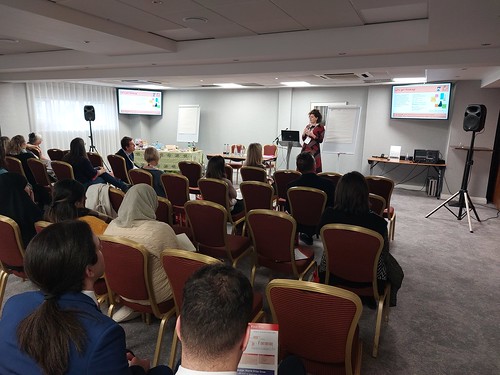
SESSION 5.1

Elaine Gelder
then proved to us that ‘It ain't what you do, it's the way that you do it.
That's what gets results’ by sharing strategies she uses firstly for
getting a rapport with pupils (starting from where they are, showing
understanding of their situation) and secondly by selecting language learning
activities which will engage them. How
lucky her students are to have her as their teacher.

SESSION 7.1
Silvia Bastow is
an extremely popular speaker and trainer, and in her session ‘Setting up
students for success: Power of modelling’ she shared tried and tested
methods for supporting students in preparing for exam tasks. Thank you, Silvia – another great GEM!
Silvia Bastow
SESSION 7.2
Wendy Adeniji presented ‘Developing a knowledge-rich, rigorous curriculum in MFL, which is
engaging and where pupils make excellent progress’ in which she described
her recommended approach to working backwards from the exam syllabus, including
KS3, so limiting the number of words taught drastically. Wendy is working closely with schools as an
advisor, and is a very popular speaker sharing a wide range of ideas. Thank you, Wendy!
Wendy Adeniji
SESSION 8.1
Bernadette Holmes
spoke with compelling passion about NCLE’s mission, along with the British Council
and the Goethe Institute, regarding ‘Building Foundations for the Future of
Languages’. Particularly stirring
and memorable for me was her appeal to separate ‘Teaching and Learning’ from
‘Testing’. Probably because this is
exactly how I feel! Thank you, Bernadette, for not forgetting what this is all
about. Yes, you want a valid and reliable
test, and this may put constraints on
the content and skills which can be tested.
But you also want to prepare young people for the real world engaging
with authentic language and real people.
Bernadette Holmes
SESSION 8.2
Thanks so much to Joe Dale
who presented superbly on ‘Possibilities and practicalities of ChatGPT in
languages teaching and learning’. I
am always in awe of the fact that he takes the risk of performing his magic
tricks ‘live’ before our very eyes .. even if he does have back-up just in case
it does not work! I have asked him to
repeat this session at the ALL London June Event, and I am really looking
forward to the repeat! He will then
follow up the session with a chance for some hand-on practice. Here's a link to
sign up to attend: https://www.tickettailor.com/events/associationforlanguagelearninglondonregionalbranch/1217879
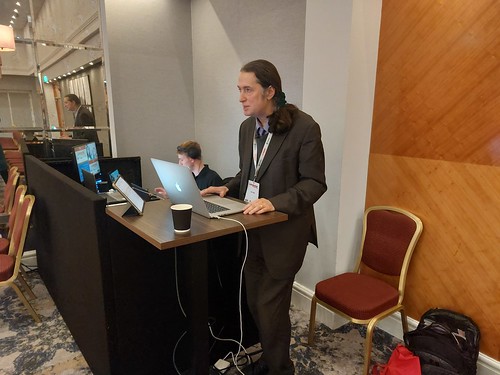
Plenaries.
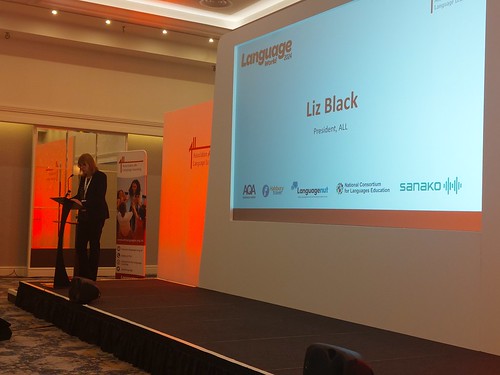
I am delighted that HMI Biamke Zemke. Ofsted Subject Lead for Languages, accepted Liz’s invitation to speak. The word ‘Ofsted’ can bring a chill to our hearts, and it is so important to be able to meet the real people behind the titles. Biamke gave an ‘Overview from the Language Research Review’, which also included some reference to the Curriculum Review which she is in the process of writing, based on recent school visits. The overview was not new to me (Michael Wardle covered this last year, and I have written extensively about it in my blog here) but nevertheless, I really valued the chance to thank her for starting her talk with the statement that ‘there is no one way to teach languages’ and to urge her to avoid the word ‘perception’ when talking about the relative difficulty of getting grades in languages. It is not a perception, it is a reality. And however we might change our pedagogy, our assessment, our time allocation, our resources, "comparable outcomes" means that grades will not change overall. For those who need persuading, David Blow is doing a webinar on Grading in ML examinations on Tuesday 21st May 2024 8-9 pm. All welcome! Register here!
Kate Borthwick’s talk entitled ‘Language Education in an AI-enabled world: the challenge, the opportunity and the future’ was an absolute model of the perfect plenary. She had us spellbound by the content, her engaging manner and the visual delights of AI -generated images illustrating her every point. If you can get a chance to see her in action, you need to take it! I loved her down-to-earth and honest approach to this new field, where no one can be certain about the future and where being flexible is absolutely key. Yes, AI poses challenges, but there are also amazing opportunities, especially in its power to help those who otherwise could not have access to individual tutoring. The challenge will be considering the purpose and delivery of formal assessment.
I am sorry I did not get a photo of Kate!
I always say that every language teacher HAS to have at least one yearly shot of Steven Fawkes in order to keep up their spirits! He spoke in the closing session which he called ‘The ? of teaching Languages. ‘What is the mystery unique ingredient?’ He joked about the fact that his title slides appeared to be giving the answer to the question as ‘Steven Fawkes’ since his name was of course under the title, but he quickly told us the answer to his question. ‘You are’, he said. It is teachers who make everything come together, who provide the essential human impact by modelling behaviour, attitudes, openness, a positive outlook, telling stories, sharing personal memories, using language for human purposes. Who give students something to look forward to. He urged us to ‘hold on to our bigger purposes’ – vision, celebrating success, providing lessons rich in culture, language content, language use. Yes, having regard for sequence and progression, but above all creating interactions, feelings, meaningful features. We are all unique as teachers, with our own personality and passions, and we can all provide the ingredient which sparks interest in our learners, through how we talk to them, how we listen to them, and how we adapt to their needs, their interests.
The great thing with Steven is
that he does not simply affirm these worthy principles. He puts them into action before our very
eyes, involving us in singing, capturing our interest through his own personal
anecdotes, making us wish that we had such special friends as he has in France,
making us rock with laughter when faced with unusual translations. I’ll be honest, I could not hold back the tears in the final part of Steven’s talk where he quoted from ‘On Work’ by Kahlil Gibran (1883 – 1931.) The
poet challenges the usual perception of work as unwelcome toil. Instead, he urges us to love our work, which
binds us with others. Steven stressed the first line. I have added a further extract to give context.
Work is love made visible.
And if you cannot work with love but only
with distaste, it is better that you should leave your work and sit at the gate
of the temple and take alms of those who work with joy.
For if you bake bread with indifference,
you bake a bitter bread that feeds but half man’s hunger.
And if you grudge the crushing of the
grapes, your grudge distils a poison in the wine.
And if you sing though as angels, and love
not the singing, you muffle man’s ears to the voices of the day and the voices
of the night.
For those who know me, you will not be surprised that this really spoke to me. I will not pretend that teaching is plain sailing, that I have never had problems in my work. But above all, I feel that it is a real privilege to be able to work alongside young people and genuinely caring teachers whose work is the visible manifestation of their love for others. I enjoy continuing to ‘work’ in retirement as a volunteer for ALL, and above all, ALL is so lucky to have Steven who works tirelessly on our behalf. Thanks to him for inspiring us.
I have been attending conferences now for over 40 years, and I love meeting ‘old’; friends and making ‘new’ ones. ALL is a broad church, reflecting a range of views and experiences. As Steven said in his talk ‘we may disagree along the way, but we get through’. The important thing for me is that we do meet, and we do listen to each other. And that can be done better at a face-to-face conference than over a 140-character exchange on social media.
Eva Lamb with her award.
I am already looking forward to next year's conference. Watch this space for details!


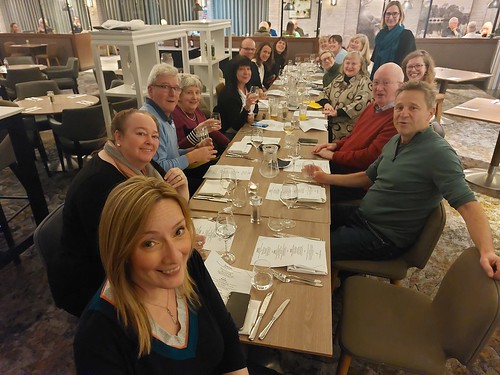


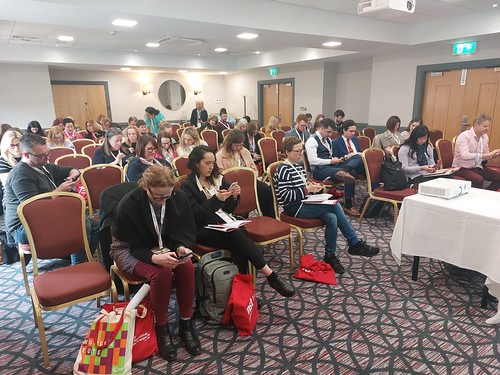
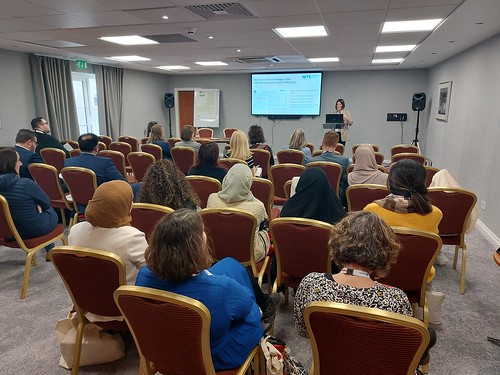
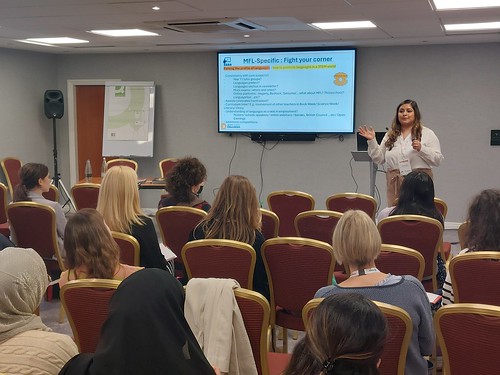
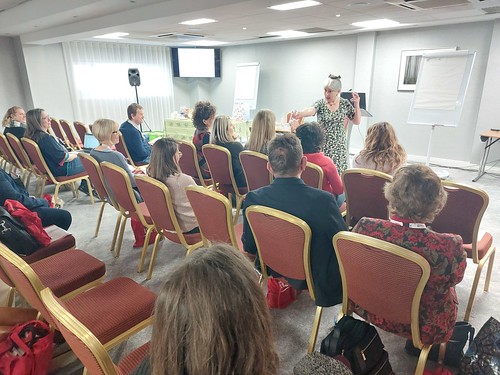

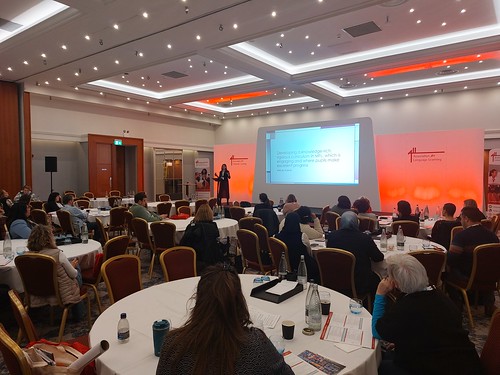

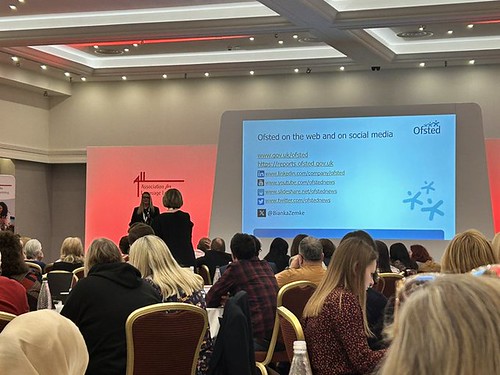
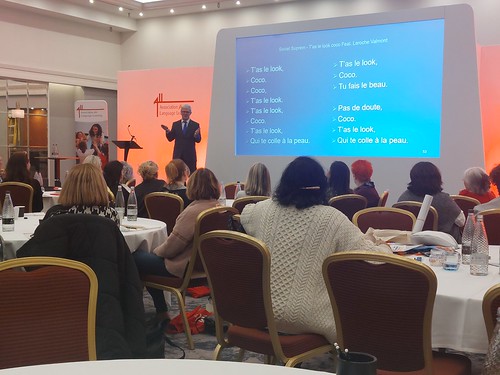
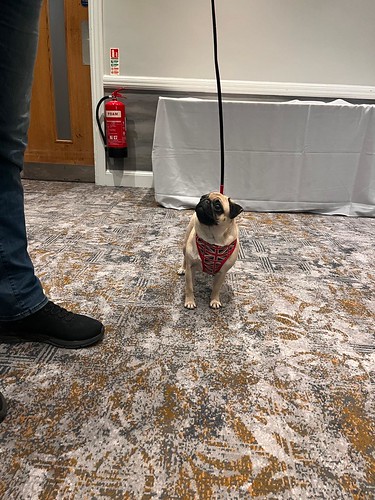
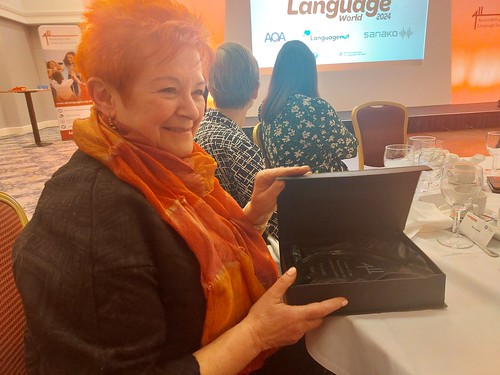
No comments:
Post a Comment